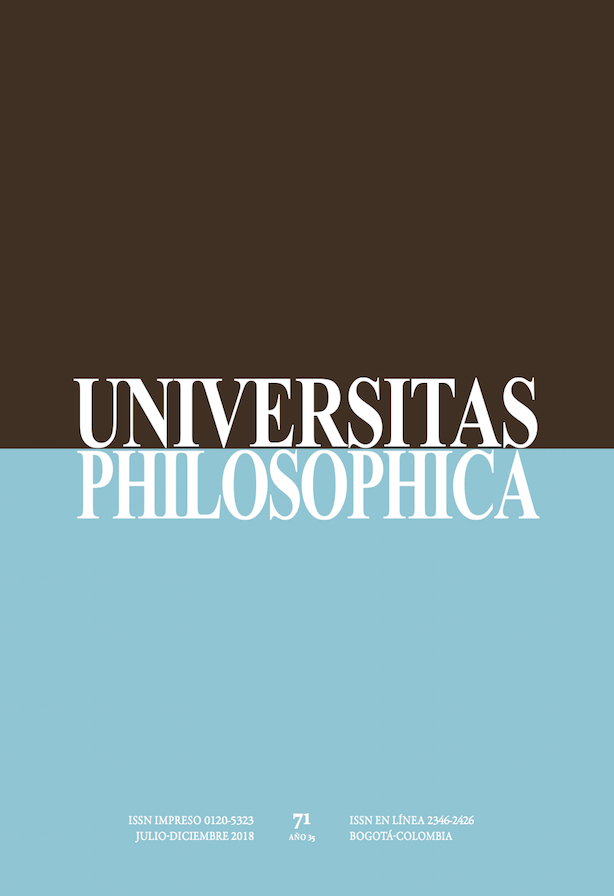Abstract
Levinas ̓s work is explicitly placed within the heritage of the Phenomenological school. Nevertheless, he repeatedly uses notions drawn from the religious tradition, especially Jewish, up to the point of stating that Judaism is a “category of being”. This paper analyses the role of Judaism as a category, beginning with a reconstruction of this notion in the most influential authors within Levinas’s philosophy. Finally, the role and meaning that this categorial structure take on in Levinas will be shown, through the examination of four main components: the exposition of alterity as separation and glory; the relationship of responsibility as election and substitution; the understanding of temporality as creation and redemption; and the prophetical understanding of language.
Baumgartner, H., Gerhardt, G., Konhardt, K., & Schönrich, G. (1976). Kategorie. J. Ritter, K. Gründer, & G. Gabriel. (Eds.). Historisches Wörterbuch der Philosophie (Tomo IV) (pp. 712-725). Basel: Schwäbe.
Casper, B. (2008a). Pensar de cara a otro. Elementos del pensamiento de Emmanuel Levinas. (Trad. D. Fonti). Córdoba: EDUCC.
Casper, B. (2008b). Rosenzweig e Heidegger. Essere ed evento. Brescia: Morcelliana. Casper, B. (2017). Das dialogische Denken. Freiburg/München: Alber.
Fonti, D. (2007). Influences of Levinas in Latin America’s Liberation Philosophy. Jahrbuch für Religionsphilosophie, 6, 183-208.
Gibbs, R. (1992). Correlations in Rosenzweig and Levinas. Princeton: Princeton University Press.
Gordon, P. E. (2010). Continental Divide. Heidegger, Cassirer, Davos. Cambridge: Harvard University Press.
Habermas, J. (2001). Israel o Atenas. (Trad. J. C. Velasco Arroyo). Madrid: Trotta.
Heidegger, M. (1997). Ser y tiempo. (Trad. J. E. Rivera). Santiago de Chile: Editorial Universitaria.
Heidegger, M. (2006). Introducción a la fenomenología de la religión. México, D. F.: Fondo de Cultura Económica/Siruela.
Herrmann, F-W. von. (1987). Hermeneutische Phänomenologie des Daseins. Frankfurt: Klostermann.
Husserl, E. (1992). Ideas relativas a una fenomenología pura y una filosofía fenomenológica. (Trad. J. Gaos). México: Fondo de Cultura Económica. Husserl, E. (1996). Meditaciones cartesianas. (Trad. J. Gaos, & M. García-Baró). México D. F.: Fondo de Cultura Económica.
Husserl, E. (1997a). Investigaciones lógicas I. (Trad. M. García Morente, & J. Gaos). Barcelona: Altaya.
Husserl, E. (1997b). Investigaciones lógicas II. (Trad. M. García Morente, & J. Gaos). Barcelona: Altaya.
Kant, I. (2007). Crítica de la razón pura. (Trad. M. Caimi). Buenos Aires: Colihue.
Krämer, H. J. (1967). Arete bei Platon und Aristoteles. Amsterdam: Schippers. Levinas, E. (1935). L’inspiration religieuse de l’Alliance. Paix et Droit, 15(8), 4.
Levinas, E. (1951). L ̓ontologie est-elle fondamentale? Revue de Métaphysique et de Morale, 56(1), 88-98.
Levinas, E. (1982). L ̓au-delà du verset. Paris: Minuit.
Levinas, E. (1987). De otro modo que ser o más allá de la esencia. (Trad. A. Pintor Ramos). Salamanca: Sígueme.
Levinas, E. (1994). Dios, la muerte y el tiempo. (Trad. M. L. Rodríguez Tapia). Madrid: Cátedra.
Levinas, E. (1995). Totalidad e infinito. Ensayo sobre la exterioridad. (Trad. D. Guillot). Salamanca: Sígueme.
Levinas, E. (1997). Quelques réflexions sur la philosophie de l’hitlerisme, Paris: Payot et Rivages.
Levinas, E. (2001). Entre nosotros. (Trad. J. L. Pardo). Valencia: Pre-Textos. Levinas, E. (2002). Être juif. Cahiers d’Études Levinassiennes, 1, 99-106. Levinas, E. (2004a). La teoría fenomenológica de la intuición. (Trad. T. Checchi). México D. F./ Salamanca: Epidermis/Sígueme.
Levinas, E. (2004b). La renaissance culturelle juive en Europe continentale. Cahiers d ̓Études Lévinassiennes, (3), 217-226.
Levinas, E. (2005a). Descubriendo la existencia con Husserl y Heidegger. (Trad. M. E. Vázquez). Madrid: Síntesis.
Levinas, E. (2005b). Difícil libertad. (Trad. N. Prados). Buenos Aires: Lilmod. Levinas, E. (2009). Parole et Silence et autres conférences inèdites au Collège philosophique. Paris: Grasset/IMEC.
Levinas, E. (2011). De la evasión. (Trad. I. Herrera). Madrid: Arena Libros. Levinas, E., & Casper, B. (2012). In ostaggio per l ̓Altro. (Trad. A. Fabris). Pisa:
ETS.
Levinas, E. (2013). Escritos inéditos I. (Trad. M. García-Baró). Madrid: Trotta. Lévy, B. (2005). Levinas et le grec [Hors-série]. Cahiers d’Études Levinassiennes, 195-278.
Rosenzweig, F. (1979). Der Mensch und sein Werk, Gesammelte Scriften (Vol. I). Den Haag: Martinus Nijhoff.
Rosenzweig, F. (1997). La Estrella de la Redención. (Trad. M. García-Baró), Salamanca: Sígueme.
Scholem, G. (2008). Conceptos básicos del judaísmo. (Trad. J. L. Barbero). Madrid: Trotta.
Úbeda, J. (2014). El prójimo da tiempo. Algunas anotaciones críticas al proyecto filosófico de Levinas. Pensamiento. Revista de Investigación e Información Filosófica, 66(249), 791-808.
This journal is registered under a Creative Commons Attribution 4.0 International Public License. Thus, this work may be reproduced, distributed, and publicly shared in digital format, as long as the names of the authors and Pontificia Universidad Javeriana are acknowledged. Others are allowed to quote, adapt, transform, auto-archive, republish, and create based on this material, for any purpose (even commercial ones), provided the authorship is duly acknowledged, a link to the original work is provided, and it is specified if changes have been made. Pontificia Universidad Javeriana does not hold the rights of published works and the authors are solely responsible for the contents of their works; they keep the moral, intellectual, privacy, and publicity rights.
Approving the intervention of the work (review, copy-editing, translation, layout) and the following outreach, are granted through an use license and not through an assignment of rights. This means the journal and Pontificia Universidad Javeriana cannot be held responsible for any ethical malpractice by the authors. As a consequence of the protection granted by the use license, the journal is not required to publish recantations or modify information already published, unless the errata stems from the editorial management process. Publishing contents in this journal does not generate royalties for contributors.


